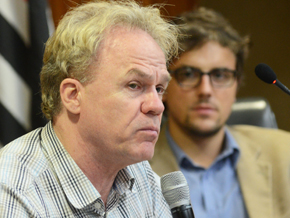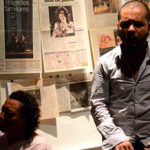In an official ceremony at Palácio do Planalto this Wednesday (10), the final report of the National Truth Commission (CNV) was delivered to President Dilma Rousseff. The document calls for homolesbotransphobia to be criminalized, in addition to other recommendations.
+ Group makes a collective complaint to impeach Jair Bolsonaro after insulting the deputy
In the document, divided into three volumes, recommendations were made to the Government regarding attitudes that should be taken in favor of the Brazilian LGBT population, including: approval of a law guaranteeing free gender identity; construction of places of memory for LGBT segments linked to repression and resistance during the dictatorship; and summoning the public agents mentioned to provide clarifications on the facts narrated in this report.
The report is the result of two years and seven months of work by the National Truth Commission, created by law 12528/2011. The CNV's proposal is to point out tactics, names, and show how the Brazilian population lived under the Brazilian military dictatorship, which lasted around two decades, from 1964 to 1985.
Installed in May 2012, the CNV was created to investigate and clarify, indicating the circumstances and authorship, the serious violations of human rights committed between 1946 and 1988 (the period between the last two Brazilian democratic constitutions) with the aim of implementing the right to memory and historical truth and promote national reconciliation.
+ When homophobia and transphobia affect heterosexuals and cisgender people
In an interview, the lawyer for the São Paulo Truth Commission Renan Quinalha stated that “truth commissions will only be able to point out names, without the power to punish”, and that the punishments of those accused “will be the responsibility of the Public Ministry and the Judiciary”. However, he warns: “if we manage to make visible and punish the homophobia of the past, we will certainly open a way to punish the homophobia of the present. They are closely associated.”
.jpg)
The report even points out repression during the government of Paulo Maluf, and cites delegates and coroners, read the excerpt: “During the entire period of the dictatorship, policies of social control and political repression adopted, in many cases, a conservative bias in moral terms. The pattern of policing that occurred in the center of the city of São Paulo between 1976 and 1982 is exemplary from the point of view of how the repression against LGBT sectors operated. The civil and military police were structured for such operations, with support from the Public Security Secretariat under the command of Colonel Erasmo Dias.
Furthermore, delegate Guido Fonseca prepared criminological studies of hundreds of transvestites, recommending the criminal offense of vagrancy as an instrument to combat homosexuality. Furthermore, during the government of Paulo Maluf (1979-1982), overt policing rounds intensified in the central area of the city, a region under the command of police chief José Wilson Richetti, clearly targeting vulnerable and stigmatized groups.”
Trans
The final report also identified violence against the transgender population who lived under persecution by the military dictatorship: “On April 1, 1980, O Estado de S. Paulo published an article entitled “Polícia already has a joint plan against transvestites”, in which it records the proposal by the civil and military police to “remove transvestites from the streets of strictly residential neighborhoods; reinforce the DEIC Vagrancy Police Station to apply article 59 of the Criminal Misdemeanor Law; designate a building to house only homosexuals; and opening a part of the city to settle them are some points of the plan drawn up to immediately combat transvestites in São Paulo”
Read the CNV recommendations
– Criminalization of homolesbotransphobia.
– Approval of a law guaranteeing free gender identity.
– Construction of places of memory of LGBT segments linked to repression and resistance during the dictatorship (e.g. Central Sectional Police Station on Rua Aurora, Legal Department XI de Agosto, Teatro Ruth Escobar, Presídio do Hipódromo; Ferro`s Bar; staircase of the Theater, Municipal etc.).
– Official apologies from the State for the violence, revocations and purges committed against homosexuals in a public event built together with the LGBT movement.
– Reparation for LGBT people persecuted and harmed by State violence.
– Summoning the public agents mentioned to provide clarifications on the facts narrated in this report.
– Revocation of the name “Dr. José Wilson Richetti” given to the Centro Sectional Police Station, of the Greater São Paulo Regional Police Stations department by Law 7.076 of April 30, 1991.
Renan states that “the inclusion of specific recommendations for the historical reparation of human rights violations against LGBT people constitutes a huge advance for Brazilian democracy. They will serve to guide the State's public policies and facilitate the mobilization of civil society to carry out the institutional reforms necessary to guarantee the right to memory and justice. Now, the LGBT movement has yet another instrument to pressure the authorities to combat prejudice and discrimination based on sexual orientation or gender identity”, and warns: these recommendations alone will not be enough. They will only come to fruition if there is effective mobilization of social movements to collect them in practice.”
* Nelson Neto He is a journalist, has worked in national and international newsrooms covering the LGBT population and has a blog of the same name – www.nelsonscneto.com – in which he talks about sexual and gender diversity.
.jpg) The report even points out repression during the government of Paulo Maluf, and cites delegates and coroners, read the excerpt: “During the entire period of the dictatorship, policies of social control and political repression adopted, in many cases, a conservative bias in moral terms. The pattern of policing that occurred in the center of the city of São Paulo between 1976 and 1982 is exemplary from the point of view of how the repression against LGBT sectors operated. The civil and military police were structured for such operations, with support from the Public Security Secretariat under the command of Colonel Erasmo Dias.
The report even points out repression during the government of Paulo Maluf, and cites delegates and coroners, read the excerpt: “During the entire period of the dictatorship, policies of social control and political repression adopted, in many cases, a conservative bias in moral terms. The pattern of policing that occurred in the center of the city of São Paulo between 1976 and 1982 is exemplary from the point of view of how the repression against LGBT sectors operated. The civil and military police were structured for such operations, with support from the Public Security Secretariat under the command of Colonel Erasmo Dias.



